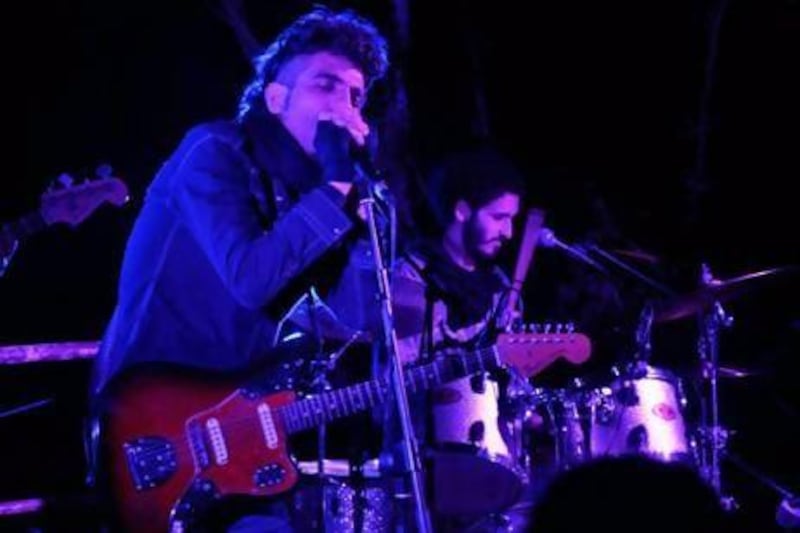The interview had been slated for late November, when the Palestinian musician Jowan Safadi would offer his unique perspective on a rock music that transcends all borders. The story of an avant-garde Arab rock artist who has played in both the Arab and Jewish worlds could not, after all, be less than revealing – about perspectives and tensions and the language of song. We were setting it up, but he had a gig in Jordan and said he might briefly be off the grid.
Then, radio – or rather, Facebook – silence. For two weeks. No communication. What, had the guy flaked?
And then the story broke out. Safadi had played in Amman with his band FishSamak, the first of two scheduled shows. “The gig was really good,” he says now. The after-show, not so much. Safadi had been hauled into a police station on November 27 before an acoustic gig in the Rainbow Theatre and jailed for 26 hours, having run afoul of authorities for “insulting religion” with a song, The Believers, deemed blasphemous. He had been shunted about the Jordanian prison system.
A “Free Jowan” campaign burst forth on the internet, as the Twitterati fought back under the hashtag #FreeJowanSafadi. Combined with pressure from lawyers, the campaign worked. Now back home in Haifa, he says: “It was a nightmare, man.”
“The uncertainty … they take your phone and your connection to the world and you’re in a cage with all these other people, not knowing where you’re going next,” he says in impeccably thoughtful English. “You’re transferred from place to place with chains on your hands. That was scary. And then you’re supposed be ‘a star’, to go on a stage with a guitar in front of people.”
Yes, you are, and yes, you do, because you are a musician with a complex and challenging trajectory. You have a history that challenges both spheres, and you are in more ways than one a man without a country. “For many years,” Safadi says, “that was the case.”
Both territorially and musically, Safadi’s story is a singularity – even for a Palestinian avant-garde rock songwriter. Born in Nazareth, his father was – surprise – a carpenter. “We even used to live on the same street as Mary and Joseph,” he jokes. And so even then, he was straddling boundaries.
Safadi started his career in Beersheba at the dawn of the new millennium, with an accidentally radical idea. He was a musical neophyte – “I hadn’t been much of a guitarist or singer back then” – so he enlisted some of the local players, who happened to be Israelis. Lenzez, the band, or “musical project” as he describes it, may have been the first and only Arab-Jewish group in the Middle East. “I didn’t really think about it then,” he says. “I was living in Beersheba and eager to make music. I didn’t question backgrounds or nationalities or religion. The people who were there were open enough to go through that experience with me.”
With a rotating line-up driven by Safadi’s songs and ideas, Lenzez played on the indie, underground Israeli scene, in Jerusalem and Tel Aviv. He says the challenge was “mainly musical, combining punk and Arabic music with experimental, lo-fi. With that Arabic vibe”.
The audiences were tiny, but for the most part receptive. “Alternative listeners are a little more aware.” But there was controversy when he intersected with the mainstream. “Whenever I gave interviews in the Israeli press, they tried to make a big deal out of me being an Arab making indie music.”
Eventually, they ran out of steam for the expectedly complex reasons. “Anyway, we couldn’t make it bigger in Lenzez – not on the Arab scene, with songs in Arabic with Israelis in the band. The band was too avant-garde for them anyway. And not on the Israeli scene, singing in Arabic.”
And there was something else, he said. “After the Second Intifada I became much more politicised. I wanted to return to my Arabic roots and culture.” He had already released an album sung in Arabic, pointedly entitled I?D. “Given the political situation, I no longer had the privilege of not choosing a side. And I felt that I was involving the people around me beyond being just players in my songs.” Lenzez dissolved after three albums in 2007.
But there were new issues to face. In rock terms, one can be without a country even in one’s own. “There are still no real Arabic rock venues in all of Palestine. I think there might be one in Ramallah. You have to use an Israeli place. Sure, there are theatres, but it’s not the same feeling or environment or acoustics as a club.”
He adds: “It’s not because of the Israelis, it’s because this whole thing is so new to us. It’s all improvisation. We take a place that’s a restaurant or a bar and create a stage.”
Safadi calls the music he’s making now “Free Arabic Rock” or “Hafla (Party) Rock”. The latest album title, Namrud (Troublemaker), indicates he has no intention of backing down, despite the recent hardships. And in any case, he’d already experienced the same, from the other side.
The Jordan incident has exposed Safadi to a larger audience, but has also compromised his freedom to take advantage of it. He’s been offered gigs in Egypt and Tunis but “there is tension now”, he says. The hate mail he’s receiving proves it. A man without a country? Maybe he should go to New York.
“Oh, I don’t know about that,” he says, and given his background, one might see his point.





